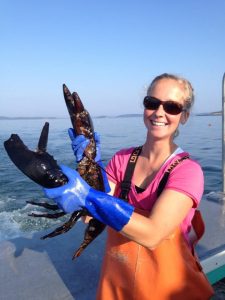Student Researcher: Transparency and Communication Essential to Research Partnerships with Fishermen
 In a concept that touches the very mission of sustainability, Sarah Ebel and her colleagues went directly to Maine lobstermen to ask questions. They were not merely asking these stakeholders for information about what they do. They were asking lobsterman how they think about their role in collaborative research – if they think they have a role at all.
In a concept that touches the very mission of sustainability, Sarah Ebel and her colleagues went directly to Maine lobstermen to ask questions. They were not merely asking these stakeholders for information about what they do. They were asking lobsterman how they think about their role in collaborative research – if they think they have a role at all.
A very different set of questions.
Ebel, a PhD student in UMaine’s Department of Anthropology, conducted the interviews with her advisor, Christine Beitl, Assistant Professor of Anthropology. They were part of a yearlong study funded by the Senator George J. Mitchell Center for Sustainability Solutions, which focused on broadening the scope of the Mitchell Center’s community-based mission.
At the center of the research was the little-known cusk, a potentially endangered finfish species often caught accidentally as “bycatch” by lobster fishermen. While other team members worked out on the water, Ebel and Beitl set out to discover what lobstermen knew about the cusk issue – and what they thought about the idea of collaborative research with universities and other entities.
“We are still analyzing themes from our research, but two salient themes come through in our interviews with fishermen emerge,” Ebel said. “They revealed mistrust between fishermen and universities and that a possible reason for the current lack of fishermen participation in research may be that mistrust. We believe that communication, transparency, and trust are necessary to conduct meaningful cooperative fisheries research.”
Ebel and Beitl spent months talking to stakeholders in Machiasport, Stonington, Bass Harbor, Boothbay Harbor and South Bristol. They discovered that many who depend on the Gulf of Maine for their livelihood were completely unaware of the cusk issue. Few knew that National Oceanic and Atmospheric Administration (NOAA) considered the fish a “species of concern”. It made sense. Cusk are not well known and they don’t seem salvageable when they arrive on deck with exposed innards. They are usually tossed overboard.
In addition to the findings about the importance of trust, Ebel said they found that meaningful collaboration with the lobstermen would requires a more holistic understanding.
“We believe that to move forward with meaningful cooperative research, we need a better understanding of fishermen identity and worldview to foster trust and transparency between stakeholder groups,” Ebel said.
The project afforded Ebel a chance to see the value of complex sustainability efforts: “I believe that the only way to solve these problems we face is to increase interdisciplinary efforts and research, and to identify and work alongside various stakeholders across Maine.”
Ebel is moving into her second year as a PhD student. She has been named a National Science Foundation (NSF) Integrative Graduate Education and Research Traineeship (IGERT) fellow along with a group of peers to study how communities, ecosystems, governments, and policies can adapt to abrupt climate change. She hopes to eventually continue her research on fishing identity and livelihood strategies in Chile.
